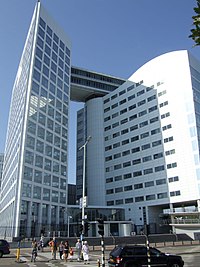Portal:Law/sbox
The Law Portal
Legal systems elaborate economic analysis or sociology. Law also raises important and complex issues concerning equality, fairness and justice. "In its majestic equality", said the author Anatole France in 1894, "the law forbids rich and poor alike to sleep under bridges, beg in the streets and steal loaves of bread." In a typical democracy, the central institutions for interpreting and creating law are the three main branches of government, namely an impartial judiciary, a democratic legislature, and an accountable executive. To implement and enforce the law and provide services to the public, a government's bureaucracy, the military and police are vital. While all these organs of the state are creatures created and bound by law, an independent legal profession and a vibrant civil society inform and support their progress. (More… )
Selected Article The Fundamental Rights, Directive Principles of State Policy and Fundamental Duties are sections of the Constitution of India that prescribe the fundamental obligations of the State° to its citizens and the duties of the citizens to the State. These sections comprise a constitutional bill of rights and guidelines for government policy-making and the behaviour and conduct of citizens. These sections are considered vital elements of the constitution, which was developed between 1947 and 1949 by the Constituent Assembly of India. The Fundamental Rights are defined as the basic human rights of all citizens. These rights, defined in Part III of the Constitution, apply irrespective of race, place of birth, religion, caste , creed or gender. They are enforceable by the courts, subject to specific restrictions.
The Directive Principles of State Policy are guidelines for the framing of laws by the government. These provisions—set out in Part IV of the Constitution—are not enforceable by the courts, but the principles on which they are based are fundamental guidelines for governance that the State is expected to apply in framing and passing laws. (more... )
Selected CaseSelected PictureSelected Statute The Australia Act 1986 is an act of the Parliament of Australia (No. 142 of 1985) and the Parliament of the United Kingdom (c.2 1986) which eliminated the remaining ties between the legislature and judiciary of Australia and their counterparts in the United Kingdom. In particular, the act resolved the anomalous power of the United Kingdom's parliament to legislate over the individual Australian states, a power that it had exercised since colonial times and which had not been affected by the 1931 Statute of Westminster. (more...) Selected BiographyAlfred Thompson Denning, Baron Denning, (more...)
How you can help Law on WikipediaThings you can do...
Legal News
Wikinews Crime and law portal
Related PortalsDid You KnowLaw Portal selected contentThis page lists some of the best work (B-Class or better) by WikiProject Law. The entries are randomly chosen for display on the Law Portal.
CategoriesWikiProjects
What are WikiProjects?
Associated WikimediaThe following Wikimedia Foundation sister projects provide more on this subject:
|














